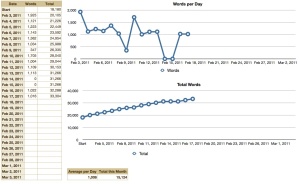I have a dilemma, and anyone’s opinion on the matter is valuable. The short version of my question is:
Is my story SciFi?
Here’s the problem:
When I think “SciFi,” I think space. I think aliens. These stereotypes are leftovers from being raised with Star Trek as the very definition of SciFi. Well, yesteryear I had a brilliant idea for a story. Basically, everybody over the age of twenty is killed by a disease. (NOTE: I looked up other stories of a similar nature after the fact, and realized that this sort of thing has been done. Mine’s unique, though. So there.) I thought, Okay, my story falls into the category of post-apocalyptic. Post-apocalyptic, it turns out, is a sub-genre of SciFi. Cool. No problem.
Except, when I think “Post-apocalyptic,” I think mayhem. I think the world just after it ended. Well, my story isn’t about the aftermath of the end of the world. It’s about the after-aftermath. The post-post-apocalypse, if you will. It’s set approximately one hundred years into the future–and again, “future” conjures up thoughts of SciFi–and the main character, Iris, has no idea that people used to live to be older than twenty. To Iris, twenty years is a lifetime. Living beyond that is unfathomable. A boy named Kaleb arrives in Iris’s town and says that he’s on a journey to find a cure for the disease that kills everyone at age twenty–a disease that Iris didn’t even know was a disease. So, curious mind that she is, she decides to go with him. The story is their journey to find the cure. It’s about how they bond. It’s about the journey to attempt to conquer death as they know it.
The thing is, although it’s in the future, there’s nothing technologically advanced at all.
The thing is, even though it’s after the apocalypse, it doesn’t seem very post-apocalypse-ish.
The thing is, even though it’s fiction based on science (the disease), it doesn’t seem very science fiction-y.
Honestly, I’ve read very few SciFi books. I would have read more if I’d known that one of my own story ideas would end up in that category. For all I know, there are a bunch of stories out there in the SciFi community that are similar enough to definitively put my book into the SciFi category. So what do you guys think? Do I have science fiction here, or do I have something else?





